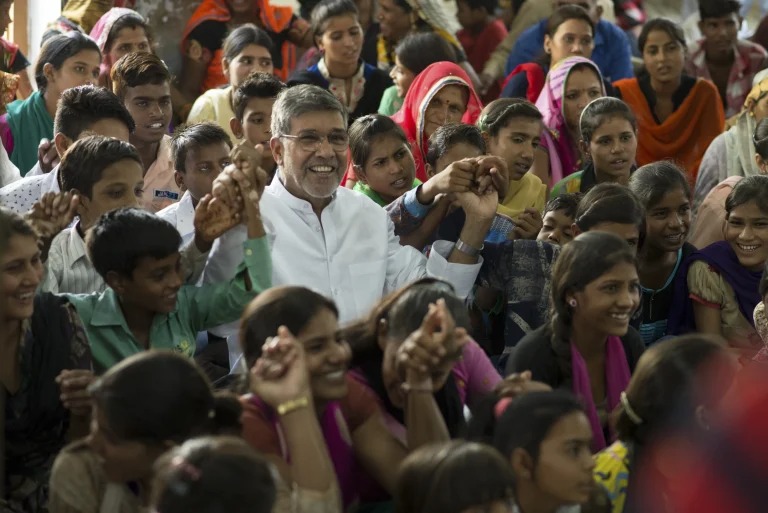Self-compassion is a basic yet effective practice that is the first step on the path to global compassion. Self-compassion provides us with the emotional fortitude and empathy required to not only heal ourselves but also actively participate in improving the world in an era of injustice, inequity, and suffering.
The core tenet of the Kailash Satyarthi Movement for Global Compassion (SMGC) is the conviction that self-compassion has the capacity to transform the world. The campaign, which was started by Nobel Peace Laureate Kailash Satyarthi, aims to solve important problems like inequality, child labor, and human trafficking. Although the movement seeks to bring about global change, it understands that self-compassion must be practiced by people before significant change can occur.
This article examines the relationship between self-compassion and global transformation, illuminating how developing self-compassion can support our collaborative efforts toward a society grounded in human dignity, justice, and peace.
What is Self-Compassion?
The technique of being kind and understanding to oneself when going through a tough moment or when confronted with one’s own inadequacies is known as self-compassion. It is about acknowledging that we all suffer as humans and choosing to handle these situations with compassion, understanding, and patience rather than condemning or rejecting ourselves.
Self-compassion encourages us to gently acknowledge our faults or challenges instead of blaming ourselves or passing judgment on ourselves. As we would care for a friend in need, this practice teaches us to accept ourselves as flawed individuals deserving of love and compassion.
In addition to easing emotional suffering, self-compassion cultivates the inner fortitude required to face life’s obstacles. For people who wish to make a significant contribution to global causes like the struggle for equality and children’s rights, this practice cultivates emotional resilience.
Self-Compassion and the Satyarthi Movement
According to the Kailash Satyarthi Movement for Global Compassion, children should not be exploited and should have access to education and improved life possibilities. Understanding the role of self-compassion in social activism is a key component of the movement’s mission, which is based on compassion for humanity.
Self-compassion is the cornerstone of social change and action. Leaders and activists who strive for justice and peace frequently experience emotional tiredness, frustration, and burnout. It becomes difficult to sustain the vigor and fortitude needed to advocate for significant change when self-compassion is lacking.
For the Satyarthi Movement, self-compassion is crucial not only for those who are directly involved in advocacy but also for every individual who wishes to contribute to a more compassionate world. When we practice self-compassion, we are more likely to support others with empathy and understanding, especially the most vulnerable in society—such as children facing exploitation or inequality.
Through self-compassion, we are reminded that we cannot give what we do not possess. If we are to effectively fight for justice, equality, and peace, we must first cultivate those qualities within ourselves. By doing so, we can extend the same empathy to others and work toward a more inclusive world.
The Ripple Effect of Self-Compassion
The capacity of self-compassion to have a cascading effect is among its most potent features. People who practice self-compassion are more able to be compassionate toward others. The Kailash Satyarthi Movement’s work is fundamentally impacted by this rippling effect.
In addition to promoting mental health and personal healing, self-compassion practices also aid in the mending of society. Being nice to ourselves makes it easier for us to interact with people, especially those who are in need of compassion, with an open mind and heart.
For the Kailash Satyarthi Movement, this entails promoting compassion in all facets of life in addition to fighting for children’s rights. Self-compassion teaches us how to confront inequalities, question damaging social norms, and bring about long-lasting change. By practicing self-compassion, we recognize that we are all interrelated and that every action we take, no matter how tiny, helps to mend society as a whole.
How to Develop Self-Compassion
Self-compassion is the first step on the path to global compassion. The following actions can help you develop self-compassion:
- Practice Mindfulness: Develop mindfulness by becoming objectively conscious of your feelings and ideas. Be mindful of your emotions with compassion and empathy.
- Be Kind to Yourself: When you are having a hard time, talk to yourself with the same empathy that you would a good friend.
- Recognize your humanity: By realizing that pain and flaws are a natural aspect of being human. Your difficulties are not unique to you.
- Forgive yourself: By letting go of past transgressions and accepting the potential for development and transformation.
- Practice Gratitude: Develop an attitude of gratitude by taking the time to recognize and value your positive traits and strengths, which enable you to make a constructive contribution to society.
The Way to a World of Compassion
In addition to advocating for global change, the Kailash Satyarthi Movement for Global Compassion also calls for individual reform. We can start the process of establishing a more equitable, just, and peaceful world by practicing self-compassion. Adopting self-compassion enables us to take meaningful action and opens our hearts to the hardships of others.
According to Kailash Satyarthi, “True change begins with self-awareness, self-compassion, and the desire to build a world where justice and peace prevail.” Developing self-compassion is the first step in building a compassionate world. Join the movement now to contribute to the group’s endeavor to create a better future for everybody.









